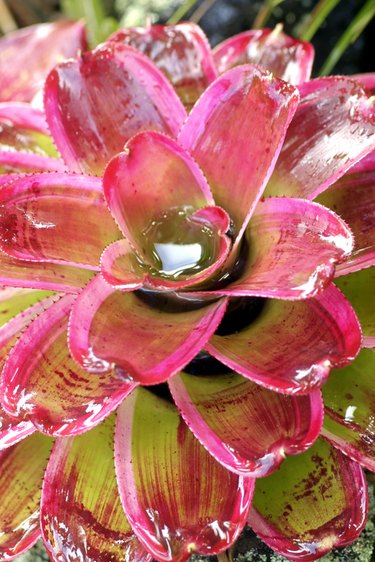Things You'll Need
Plant bags
Peat moss
Bark, shredded
Perlite
Plant hooks

Bromeliads hung from a garden wall create a lush tropical environment that looks like you spend hours on the upkeep. These hardy plants, however, are deceptively easy to maintain and tolerate a range of temperatures. Whether you wish to create a living wall in your garden or add foliage as the backdrop to a seating area, bromeliads bring color and style to your yard.
Step 1
Evaluate the lighting your wall garden will receive. Full sun typically refers to 6 or more hours of direct sunlight a day, while 4 to 6 hours refers to partial sun, and areas that receive little or no direct sunlight are considered shaded.
Video of the Day
Step 2
Browse bromeliads that require the lighting your wall provides. Choose a selection of bromeliads in different sizes, shapes and colors for the most dramatic display. Pay attention to the foliage shape and texture, too, as these add detail to your bromeliad display wall.
Step 3
Fill plant bags with one part peat moss, one part bark and one part perlite for a lightweight potting mixture that drains quickly. Potting soil is too heavy and dense for bromeliads and might cause issues with drainage and aeration.
Step 4
Plant bromeliads in the plant bags, and secure the soil around the roots. Water thoroughly until water runs freely through the bottom of the bag.
Step 5
Add plant hooks to your garden wall to support your plant bags. Hooks vary from small cup hooks that can be screwed into wood to decorative hooks that require additional hardware. Follow the instructions from the manufacturer to install the hooks of your choice.
Step 6
Cluster the plant bags on your garden wall to create a vertical tropical garden. Pair plants with varying textures, size and colors to highlight the beauty of each.
Tip
Make your own plant bags or pots by forming a ball of moss around the roots of the bromeliad and wrapping it in netting or chicken wire. Staple the edges of the netting to a section of decorative wood, and secure the wood to your wall with nails or screws.
Warning
Many bromeliads are drought tolerant, but watering them is still necessary. Follow the instruction for your specific bromeliads to meet their watering needs.
Video of the Day